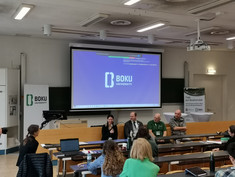Soil Biodiversity Matters: How Global Challenges Threaten Soil Biodiversity
At Tage der Biodiversität 2025, our colleagues Katharina Keiblinger and Rajasekaran Murugan led an insightful session on how global challenges threaten soil biodiversity and, in turn, ecosystem health. The session brought together experts from science, policy, and practice to discuss solutions and highlight the urgent need for multidisciplinary research.
Soil organisms, critical for ecosystem services such as food provision, water purification, and climate regulation, face multiple global pressures (drought, flood, pollution, land use intensification etc.,) and are poorly represented in biodiversity databases. The session was aimed at highlighting the need for multidisciplinary research to tackle these simultaneous challenges, supporting European goals like the Mission Soil Deal and climate adaptation. The session was opened by the Keynote speaker Dr. Julia Seeber (University of Innsbruck) to stress the importance of soil organisms, especially the critical role of soil fauna in maintaining ecosystem services in mountain and agricultural ecosystems. Dr. Markus Gorfer vividly presented ongoing efforts to measure soil fungi in protected areas across Austria. On the other hand, cultural landscapes of Austria are often underrepresented in soil biodiversity monitoring efforts. The nationwide survey on soil biodiversity (including macrofauna, mesofauna and microorganisms) in 400 test sites across Austrian cultural landscapes was presented by Dr. Johann Zaller. The drivers of earthworm biomass and abundance in European agroecosystems were highlighted by Ms. Mittmannsgruber along with existing pitfalls in European earthworm databases. Land use intensification pressures to soil biodiversity in mountain soils (Dr. Pfingstl), across urban-rural gradients (Ms. Wellinger) and in urban gardens (Ms. Sturm) were presented.
A panel discussion was moderated by Dr. Katharina Keiblinger to discuss key highlights and pressing issues with a multistakeholder panel consisting of scientists (Dr. Julia Seeber), policy makers (Dr. Franz Fehr), and practitioners (Mr. Alfred Grand and Mr. Stefan Schmidt). The discussions were revolving around the vital role of soil biodiversity in soil, plant, animal and human health. In addition, important pitfalls in current soil monitoring along with the need to adapt climate-smart management practices were discussed. Finally, the panel highlighted key actions that are needed to bring scientific evidence to policy making at local to national level.

